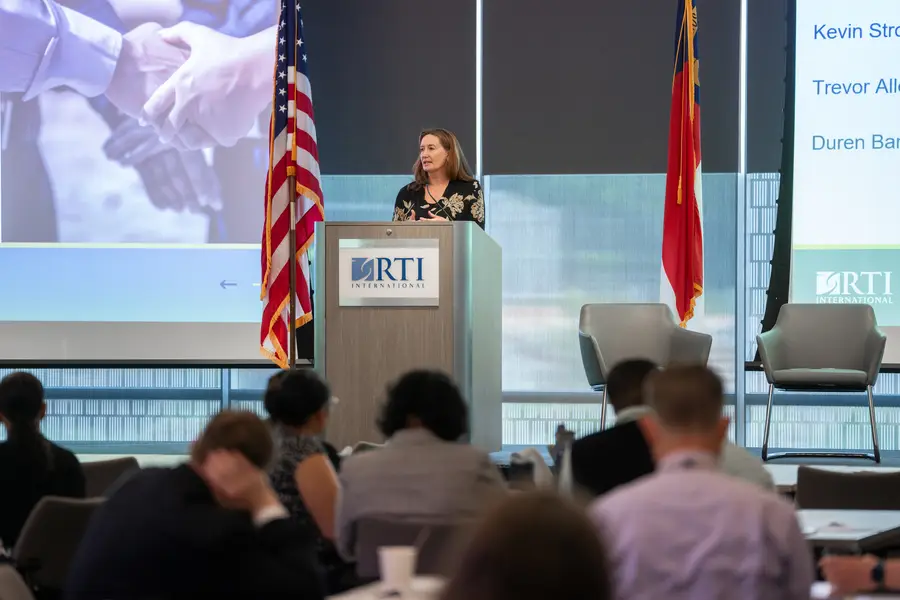Improving the Criminal Legal System with User-Centered Research
Duren Banks is a criminologist dedicated to advancing outcomes for preventing and responding to crime and violence.
Duren Banks is a criminologist dedicated to advancing outcomes for preventing and responding to crime and violence.

In an ideal society, a fair criminal legal system acquits the innocent, punishes the rightfully convicted, and rehabilitates the incarcerated for successful reintegration back into their communities. With over 3,000 counties that have unique court systems and differing state systems in the U.S., this is easier said than done. Many times, the outcome of a court case depends on where the arrest takes place and access to an attorney. And often, these factors are more influential in determining outcomes than the facts of the case.
Duren Banks, PhD, a criminologist by training, knows the complexity of the U.S. criminal legal system all too well. In her early career, working for the Bureau of Justice Statistics, the statistical arm of the Department of Justice, Duren oversaw court-related data collections. This experience exposed her to the myriad ways that people process through the system.
“You think about the criminal legal system as largely conducting trials with vigorous prosecution and defense counsel, but most people don’t even get to that point,” said Duren. “Around 95% of people who are charged with a criminal offense don’t go to trial. They plead out, or their case is disposed in some other way.”
Many defendants face challenges when they are detained pretrial or cannot afford an attorney. Duren learned that it may appear more advantageous in the short term for the accused to plead to a lesser offense than go through a trial. Individuals who are detained pretrial can lose their job, home, child custody, etc. These facts weigh into someone’s mind when they decide to plead to a lesser charge and potentially avoid these outcomes, along with those that are associated with a felony conviction.
The process of the criminal legal system is one of many misconstrued realities that Duren discovered in her early career. Now serving as the Senior Vice President of RTI’s Justice Practice Area, she devotes her time to identifying and addressing the limitations of the criminal legal system by overseeing and creating applications that directly benefit communities, practitioners, and professionals.
“We all have priorities to have an efficient system that is fair and just,” she said. “In that context, it’s important to understand the people who work and come in contact within those systems and who need support beyond what the criminal legal system can offer.”
Duren has had many life experiences that led her to study criminology. Growing up, she had someone close to her who cycled in and out of the juvenile and adult criminal justice systems. She often wondered why this cycle happened to this person and not others.
“It sparked a curiosity in me,” states Duren. “I often questioned what the risks for are why somebody gets involved in those systems or why they don’t. What protective factors are there that prevent somebody from being involved in them?”
Duren was also exposed to the legal system at a young age, as her father was a criminal defense attorney. She often had conversations with him and her family members about the fairness of the criminal legal system and the factors that may drive outcomes in one jurisdiction or situation as compared to others.
These experiences, along with her fascination with human behavior, led Duren to earn her bachelor’s degree in sociology at Wake Forest University. She combined this passion with her skill for math and earned her master’s and doctoral degrees in criminology at the University of Maryland, College Park. She was interested in a career outside of academia that had direct implications for those who engage with the criminal legal system, which led her to the Bureau of Justice Statistics and then to RTI.

Over the course of her career, Duren has observed changes in the criminal legal system, from social reform to the use of data and digital resources to understand what’s happening in real time. She is particularly proud of developing approaches to solve persistent data limitations. She worked with the Bureau of Justice Statistics and RTI to address arrest-related deaths.
When looking for data on arrest-related deaths, she led a team that found that the federal government’s databases were incomplete. She worked with people in different disciplines, including medical examiners, coroners, analysts, and law enforcement professionals to explore and test ways to solve the problem. Her team used open-source data collection approaches to measure and address missing information in official systems.
“The FBI had one of the largest databases at the time that tracked this information, but our analysis found that they were missing about 50% of people who died in law enforcement custody,” said Duren.
To fill the gap, Duren’s team relied on more localized and unofficial sources like news media outlets and reports from medical examiners and coroner’s offices that reported arrest-related deaths. By pulling in data beyond what the federal government had collected, her team was able to better understand the rate of deaths and why they occurred. This information helps point to solutions to prevent future deaths.
“Understanding the circumstances of arrest-related deaths can help inform policy and practice,” she said. “It also identifies where there may be a need for more community and law enforcement partnerships, which I think also can go a long way in developing more successful approaches to engaging with residents and de-escalating situations while keeping communities and law enforcement safe.”
Duren also emphasized the importance of a user-centered approach when collecting and applying complex data. It is important to start with the end user in mind when beginning a research or technical assistance project.
“It’s about prioritizing community and practitioner priorities and needs above those that are solely developed by researchers,” said Duren. “It’s the people who are impacted by crime and who work in those justice system agencies that need accessibility to research first.”
A few years ago, Duren’s team had another opportunity to more intentionally focus on the needs of practitioners across the criminal legal system. She led the merger of two RTI teams: social scientists and forensic scientists who were both focused on improving justice outcomes but relied on very different disciplines to do so. While challenging, it created a new environment that fostered better research and advances for the criminal justice system.
“It was a challenge because physical and social science disciplines can feel like completely different languages and approaches,” said Duren. “It took a lot of energy and attention to leverage synergies where we could work better together, but it makes sense and works really well.”
Despite the data limitations to our current criminal legal system, Duren is optimistic about the future. Advancements in technology and data collection have allowed for more information to understand what’s happening in real time. Some examples include access to data from 911 calls, police officer body cameras, personal mobile technologies, and closed-circuit cameras.
The digital explosion has really impacted our society at large and really affects what we do with our criminal justice research. Advances in artificial intelligence, machine learning approaches, and other analytic techniques have the capacity to process and identify relationships across large amounts of information, such as recent advances in Forensic Genetic Genealogy. Attention to community needs first and a full understanding of the promise and limitations of data sources are critical as we leverage these advances in technology and analytic capabilities. This focus also allows investigators to develop strategies to support victim resilience, solve cold cases, and address challenges in the criminal legal system. – Duren